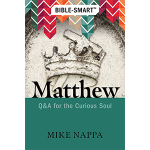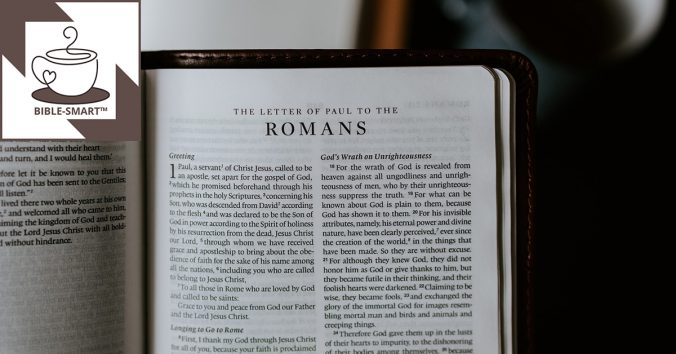Scripture: Romans 1-16
Let’s try an experiment, you and I.
We know that spiritual growth accelerates when we read the Bible and pray. And we know that the biblical book of Romans is the foundational explanation of the theology of our Christian faith. In fact, Martin Luther once said of Romans, “The more it is dealt with, the more precious it becomes.”
So let’s try this:
- First, bookmark this web page so you can come back to it frequently. Then …
- Every day for the next 31 days, let’s take the main messages in the book of Romans—and pray them back to God.
What do you think might happen then?
•••
DAY 1
Jesus, I’m your servant, set apart for your gospel. In humanity you’re descended from King David; through your Spirit of holiness you’re the Son of God! You proved this powerfully when you raised from the dead, giving grace to all who belong to you. May your grace and peace flow through me today. Amen!
From Romans 1:1-7
DAY 2
Jesus, faith in you is being reported all over the world, and I get to be part of that! Right now, in this prayer, I want to remember those who serve you in my community, nation, and world. Lord, please make us strong today. Help us to encourage and build each other up. Don’t let us be ashamed of your gospel—the power of God for salvation! We live by faith in you. Amen.
From Romans 1:8-17
DAY 3
Lord, from the first moment of creation your invisible qualities—your eternal power and divine being—have been clearly seen. Still, some of us have refused to see you. We’ve let our thinking become futile, and our foolish hearts be darkened. Forgive us, Jesus. Amen.
From Romans 1:18-21
DAY 4
Oh God, too many of us have exchanged your immortal glory to worship shallow images of you in creation. We’ve exchanged truth for a lie, indulged in shameful lusts, and allowed our lives to be filled with every kind of evil. Today, Lord, once again, please forgive us. Amen.
From Romans 1:22-32
DAY 5
Jesus, it’s hard sometimes to avoid passing judgment on others—even though I’m guilty of sin like they are! You’ve been kind and tolerant and patient to me; help me understand how your kindness leads to repentance—not my angry judgments. You don’t show favoritism; you alone are worthy to judge. Help me remember that today. Amen.
From Romans 2:1-29
DAY 6
Father God, thank you for entrusting your word to the world through the Jewish people—even though some haven’t believed in your Son. You’re always faithful (even when we’re faithless!), always true even if every human is a liar. Help me today to be faithful to you. Amen.
From Romans 3:1-8
DAY 7
Father, I know this is true: There is none righteous, not even me. All of us have sinned and fallen short of your glory. BUT … We’re justified freely by your grace and by the redemption you provided. You’ve given us faith—and we are saved! Thank you! Amen.
From Romans 3:9-31
DAY 8
Jesus, how grateful I am for the example of Abraham. Through him you showed that righteousness comes from you, by faith. As David said, “Blessed is the one whose sin the Lord will never count against them!” So today, Lord, I trust in you who were raised to life for my justification. Thank you! Amen!
From Romans 4:1-25
DAY 9
Lord God, I’m awed by the fact that I can have peace with you through Jesus Christ. At just the right time, when I was powerless, Christ died for me. While I was still a sinner, you died for me! I’m eternally grateful. Amen.
From Romans 5:1-11
DAY 10
Father, you saw it happen: Sin entered the world through Adam, and death through sin. Death reigned until … Your One and Only Son came along. Now, right now, grace reigns for me through the life of Jesus Christ, my Lord! Help me remember this today. Amen.
From Romans 5:12-21
DAY 11
Sometimes, Jesus, I’m tempted to keep on sinning so your grace keeps on growing—but I know that’s foolish! Instead, Lord, help me live in truth: My soul is dead to sin, raised to new life in you. Don’t let sin be my master today; help me live instead wrapped completely in your grace. Amen.
From Romans 6:1-14
DAY 12
Father, I’m humbled. I once was a slave to sin which was leading me to death. Yet now, thanks to you, I’m free from that! The wages of my sin should’ve been death, but instead I’ve received your gift—eternal LIFE in Christ Jesus my Lord. Thank you. Amen.
From Romans 6:15-23
DAY 13
I see today, Lord, an example from marriage. When a husband dies, the wife is no longer bound by the law of marriage. Likewise, I’ve “died” to the ancient Law so I might belong to you instead. I’m released from the law, and sin, and can now serve God in the strength of your Spirit. Help me to live this truth today. Amen!
From Romans 7:1-6
DAY 14
God, your law teaches me what sin is. I see the good I want to do—yet I don’t do it. I see evil I don’t want to do—yet I keep doing it anyway. I feel wretched! Who will save me from myself? You, of course. Only, always you, who delivers me again, today, through Christ Jesus, my Lord. Amen.
From Romans 7:7-25
DAY 15
What comfort today! There is now no condemnation for people who, like me, are in Christ. You’ve set us free from the law of sin and death! Your Spirit testifies still today that I’m your child. I’m a co-heir with Christ. I’ll share in his suffering—and in his glory. Amen!
From Romans 8:1-17
DAY 16
Jesus, this life is hard—you know that. But our present suffering doesn’t compare to the glory you’ll reveal in us. Your Spirit helps in my weakness, even interceding with groans that language can’t express. Help me today to remember your glory to come, to lean on you in my weakness. I trust in you. Amen.
From Romans 8:18-27
DAY 17
God, in all things you work for the good of those who love you—that’s what your Scripture says. If you’re for me, who can be against me? What possible thing could ever separate me from you? Hardship? Poverty? Death or life? No, nothing in all creation can ever separate me from your love in Christ Jesus! I need your help to remember that today. Thank you, amen.
From Romans 8:28-39
DAY 18
Lord, it confuses and saddens me sometimes to discover that many of your people of Israel could miss your mercy and compassion. Meanwhile non-Jews are allowed—by faith—to be called your people in Christ. This is a stumbling block for many; today may it strengthen my faith in your love. Amen.
From Romans 9:1-33
DAY 19
Jesus, my heart’s desire echoes the cry of your Apostle Paul: May the people of Israel be saved by you. I ask for your Spirit—today—to continue to make known that righteousness is available to anyone who believes, for everyone who calls on the name of the Lord! Amen.
From Romans 10:1-24
DAY 20
God, this much is clear: You didn’t reject your people of Israel! At all times, even now, you’ve kept a remnant for yourself. And now your remnant is chosen by grace, no longer chosen by works or else grace wouldn’t be grace! So please help me to experience your grace afresh today. Amen.
From Romans 11:1-10
DAY 21
Jesus, you’re amazing! You’ve taken Israel’s struggles with righteousness and used them to create riches for the world. It’s like natural branches broke off a vine, and you grafted in wild olive shoots to receive your life in their place. Today may I understand better what this really means for me. Amen.
From Romans 11:11-24
DAY 22
Father, there’s mystery in the way you work. You’ve promised to save Jew and gentile alike—and your gifts and call are irrevocable. Our disobedience is no match for your mercy! Today, Lord, please have mercy… again. Amen.
From Romans 11:25-36
DAY 23
Jesus, considering your mercy, help me offer my body in service as a living sacrifice—something holy and pleasing to you. Renew and transform my mind so I can pursue your good, pleasing, perfect will! Help me today to humbly share my gifts, and cheerfully encourage others’ gifts too. Thank you! Amen.
From Romans 12:1-8
DAY 24
Lord, my love must be sincere. I need to hate evil and cling to good; to be devoted to my family in Christ; to be joyful in hope, patient in affliction, and faithful in prayer. Today, minute by minute, please don’t let me be overcome by evil, but help me overcome evil with good. Amen!
From Romans 12:9-21
DAY 25
Holy God, politics are such a pain—help me remember no authority is put over me except what you’ve established. Please give me grace to submit appropriately to those who govern me, and to give to everyone what I owe, especially respect and honor. Amen.
From Romans 13:1-7
DAY 26
Dear Jesus, I want to owe nothing to anyone—except an ongoing debt of love for others. Your law is summed up in one rule: Love my neighbor as myself. Today I’m asking you to help me love well, live well, and be clothed in you all day long. Amen!
From Romans 13:8-14
DAY 27
Lord, today when I’m strong in faith, help me accept and encourage ones who are weak. When I’m weak, help me find grace from the strong. I need to remember that none of us lives to ourselves alone! Whether we live or die, we belong to the Lord. Thank you, amen.
From Romans 14:1-11
DAY 28
Lord, why do I so easily pass judgment? Help me keep away from that, and avoid being a stumbling block to others. With your Spirit, I can make every effort to encourage peace and mutual support with others. Let’s do that today, Jesus! Amen!
From Romans 14:12-23
DAY 29
This is my prayer today: Give me the same attitude of mind toward others that Christ Jesus had, so that with one mind and one voice we glorify you, the God and Father of our Lord Jesus Christ. Fill me with all joy and peace as I trust in you, so that I may overflow with hope by the power of your Holy Spirit. Amen!
From Romans 15:1-13
DAY 30
Dear Jesus, the Apostle Paul reminds me today that you’ve filled us with goodness, and made us complete in knowledge to be able to teach one another about you. Thank you for Paul’s encouragement—even when he faced great struggles! Help me to follow Paul’s example of faith today. Amen.
From Romans 15:14-33
DAY 31
Dear God, I want to be wise about what’s good—and innocent about evil. I’m waiting for the day when you’ll crush Satan under my feet. Lord, you’re able to establish me in accordance with the gospel. To you, the only wise God, be glory forever through Jesus Christ! Amen.
From Romans 16:1-27
•••
Congratulations! You’ve done something unique and powerful—you’ve prayed through all of Romans in just 31 days. My hope is that the time you’ve spent in these prayers has been a catalyst for renewed spiritual growth, and given you a deeper understanding of—and appreciation for—the Christian faith we hold so dear.
Sources:
BSB 197
Have a question about the Bible? Use the Ask link to submit your question for future consideration on Bible-Smart.com.
Looking for more? Check out these links:













